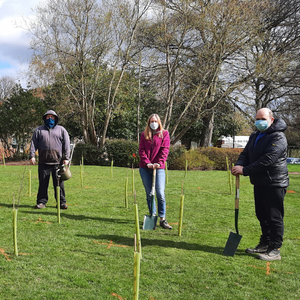
Cumbria, Northumberland, Tyne and Wear NHS Foundation Trust (CNTW), the largest provider of mental health and disability services across the North of England, is celebrating progress made towards its climate-friendly sustainability goals, six months since the organisation launched its ‘Green Plan’.
Steps the Trust has taken towards greater sustainability include:
- 1000+ trees planted, and exploration of ‘re-wilding’ areas of sites to benefit wildlife has begun
- 70% reduction in single-use plastic in the Trust’s canteens and cafes
- Increased recycling facilities
- Procurement processes and supply chains reviewed to ensure ecological and environmental impacts are considered
- Staff cycling forum launched to encourage active travel to work
Sam’s Story
‘Sam’s story’ is an animation which accompanies our Green Plan, illustrating our vision of what working at CNTW in a sustainable future could look like. It follows Sam’s life from 2021 to 2050, seeing how things change throughout their career as the Trust works towards its Green Plan goals and adapts to the impacts of climate change.
The inspiration for ‘Sam’s story’ came from a quote by Nelson Henderson which was often discussed during the development of the Trust’s Green Plan: “The true meaning of life is to plant trees under whose shade you do not expect to sit.” We hope that it serves as a prompt for discussions about the impact the changes and efforts we make now may have on future generations.
Anna Foster, Trust lead for strategy and sustainability at CNTW, said: “Climate change and pollution pose a serious threat to the health of the people we serve, and we have a responsibility to deliver our services in a sustainable way. We have already taken some big steps in recent years to reduce our waste and lower our emissions, but our Green Plan clearly sets out ambitious goals for providing more sustainable care.
“Six months since we launched our Green Plan, I am proud to say that we have already made significant progress against it. This would not have been possible without the commitment and hard work of staff at every level of our organisation, and the involvement of our volunteers, service users, and their families and carers.
“We believe that by working together, focussing on hope and opportunities for change and recovery, we can continue to make a positive impact.”
The NHS is responsible for around 4% of the UK’s carbon emissions. In the lead up to COP26 – the world’s largest climate action conference – it is clearer than ever that if the country is to achieve its climate goals, the NHS must play a major part in the solution.
In March 2020 CNTW’s Board of Directors joined a growing number of NHS organisations in declaring a ‘climate and ecological emergency’, and the Trust’s Green Plan was launched in April this year. It sets out how the Trust aims to reduce its carbon emissions to ‘net zero’ by 2040, and actions it will take to meet other sustainability goals by 2026. (The Trust’s plans support the national ambition for the whole NHS in England to be carbon neutral by 2040.
Progress has been made on tree-planting and ‘re-wilding’ to make the most of the Trust’s many leafy green spaces. To celebrate the launch of the Green Plan, in April volunteers and service users planted a total of 1000 trees across four of CNTW’s hospital sites (St George’s Park in Morpeth, Carleton Clinic in Carlisle, Hopewood Park in Sunderland, and St Nicholas Hospital in Newcastle) as part of the NHS Forest. Once mature, the thousand trees have the potential to absorb 21 tonnes of carbon from the atmosphere every year. They will also provide a habitat for wildlife, and offer staff, service users, and local people more space to enjoy nature – something which is proven to boost mental wellbeing.
NTW Solutions, a wholly owned Subsidiary Company of CNTW which provides estates, facilities, finance, workforce and procurement services to the Trust, is also signed up to the Green Plan and will be integral to achieving its goals.
Together, CNTW NHS Foundation Trust and NTW Solutions have reviewed their existing procurement processes, and are reviewing current supply chains, to ensure ecological and environmental impacts are considered when purchasing goods or services. Business cases proposing changes to services are also expected to evaluate any potential social and environmental impact.
NTW Solutions’ catering teams have worked hard to switch many items to non-plastic alternatives including paper straws, wooden cutlery and stirrers, cardboard coffee cups and salad containers and compostable takeout boxes and plates. This has already resulted in a 70% reduction in single-use plastic in the Trust’s canteens and cafes. To reduce waste, staff are encouraged to bring their own re-usable containers and cups to the cafes.
There has also been a focus on increasing provision of recycling bins on the Trust’s sites, and planned enhancements to the lease car scheme will aim to encourage the use of more eco-friendly electric vehicles.
An online community has also been set up on Microsoft Teams for CNTW staff interested in the organisation’s sustainability work, providing a space to contribute and discuss ideas. A series of fortnightly lunchtime ‘climate health conversations’ held via video-call proved very popular, bringing staff together to discuss the impact of climate and ecological change, and to share ideas on what changes could be made at work to be kinder to the planet. A cycling forum has also been created, where staff can share their innovative ideas to improve cycling across the organisation, for example, by buddying up to explore new routes to workplaces.
Even before the Green Plan was launched, CNTW had made significant strides in becoming more sustainable; CNTW has purchased renewable electricity since April 2020, and had already begin incorporating more electric vehicles into the Trust’s fleet.
